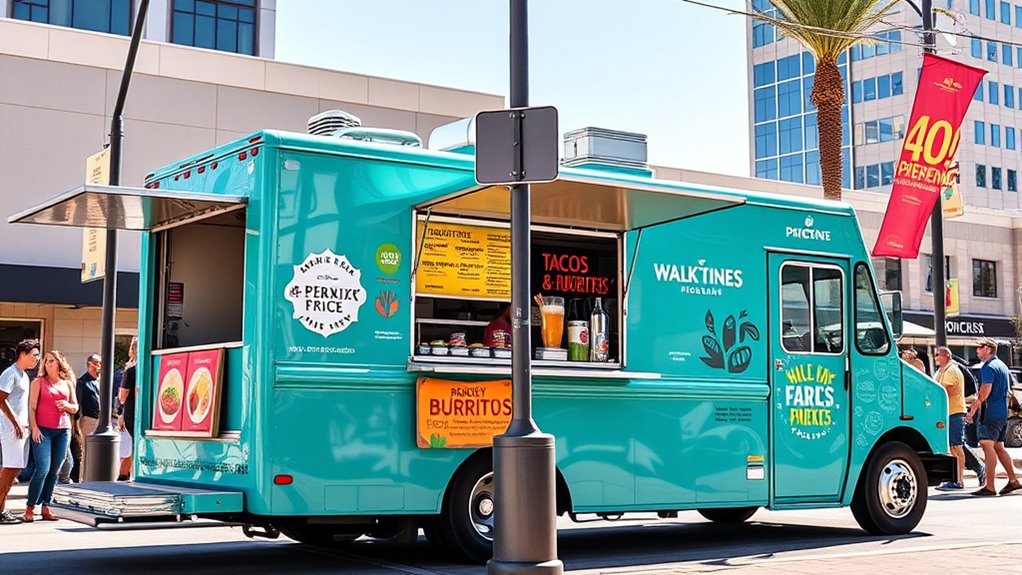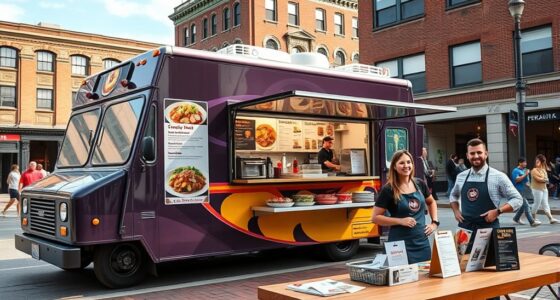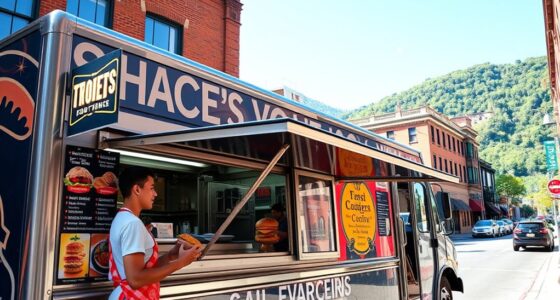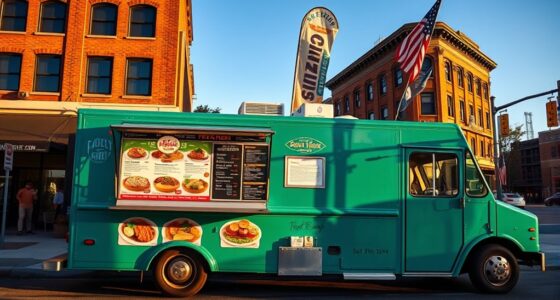To open a food truck in Phoenix, you’ll need permits like a Mobile Food Vending License, costing around $350-$2,000, along with health and sales permits. Budget for truck costs between $30,000 and $175,000, plus monthly expenses of $5,000–$10,000. Find approved locations with proper zoning and permission, develop a safe menu, and utilize marketing strategies like social media to grow your brand. Continuing your efforts will help you navigate the process smoothly and succeed.
Key Takeaways
- Obtain necessary permits including Mobile Food Vending License, health permits, building permits, and a state sales tax license for legal operation.
- Budget $50,000–$250,000 for truck purchase, permits, supplies, and initial setup, with ongoing monthly costs of $5,000–$10,000.
- Secure location permissions from private property owners and ensure compliance with zoning, setback, and parking regulations.
- Develop a menu tailored to truck size, focus on food safety, and follow HACCP standards and sanitation protocols.
- Leverage social media, participate in local events, and build customer loyalty to enhance visibility and drive sales.
Navigating Permit Requirements and Licensing Processes
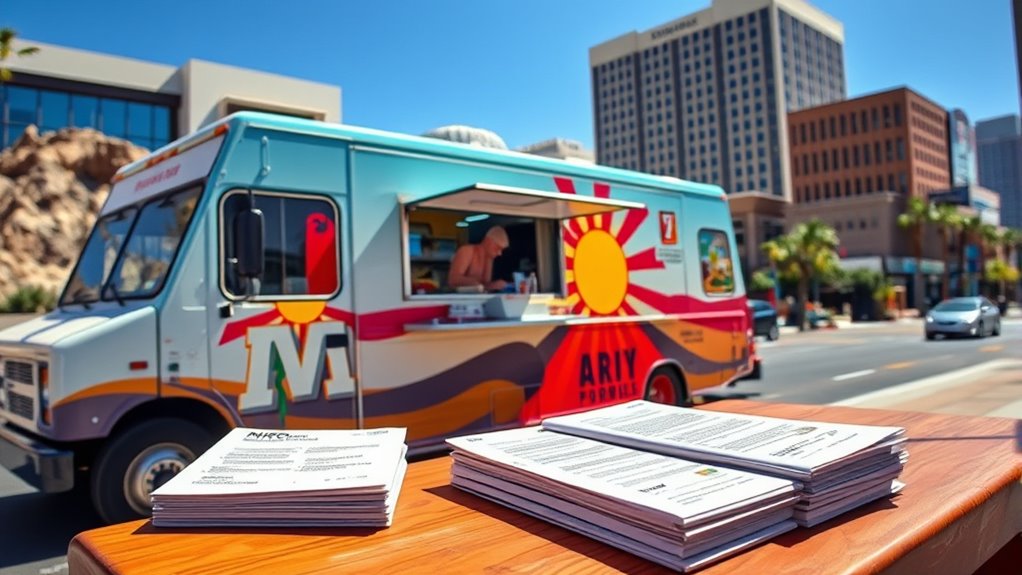
If you’re starting a food truck in Phoenix, steering the permit requirements and licensing processes can seem intimidating. First, you’ll need a Mobile Food Vending License to operate on private property, which involves a $350 application fee and a $30 annual permit fee. You may also need a Building or Use Permit from the Planning & Development Department, depending on your vending location. To collect sales tax, apply for a State Privilege (Sales) Tax License through the Arizona Department of Revenue. Additionally, secure food permits from Maricopa County Environmental Health—these vary based on your vending type. You’ll also need to register your business entity with the Arizona Corporation Commission. The application process requires detailed personal and business info, fingerprints, and proof of site permission, along with full disclosure of any criminal history over the past five years. Understanding permit compliance is essential to ensure your food truck operates legally and smoothly in Phoenix.
Understanding Costs and Fee Structures for Your Food Truck Business
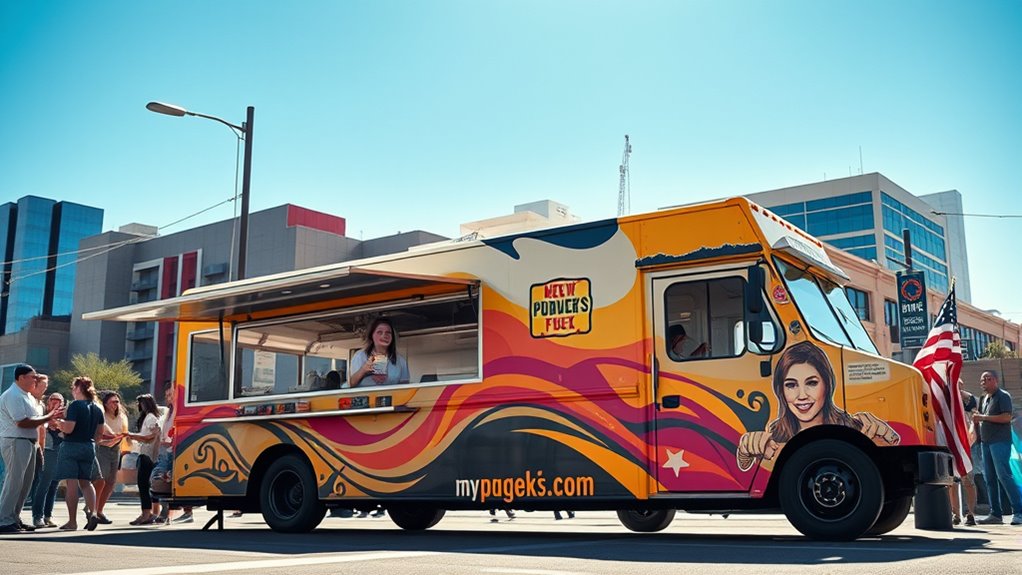
Understanding the costs and fee structures involved in launching and running your food truck in Phoenix is essential for creating a realistic budget and ensuring long-term success. Startup costs vary widely based on truck type and equipment. A new truck can cost between $50,000 and $175,000, while used trucks range from $30,000 to $70,000. Renting may cost $2,000–$4,000 per month. Licensing and permits typically run $500–$2,000, with total initial expenses including permits, inventory, and equipment reaching $50,000–$250,000. Insurance costs average $2,000–$4,000 annually. Monthly operating expenses fall between $5,000 and $10,000, covering fuel, supplies, and labor. Here’s a quick look: cost considerations.
| Expense Type | Cost Range | Notes |
|---|---|---|
| Truck Purchase | $30,000–$175,000 | New or used |
| Permits & Licenses | $500–$2,000 | Phoenix-specific |
| Monthly Operating | $5,000–$10,000 | Includes fuel, staff, supplies |
Exploring Permissible Locations and Zoning Regulations
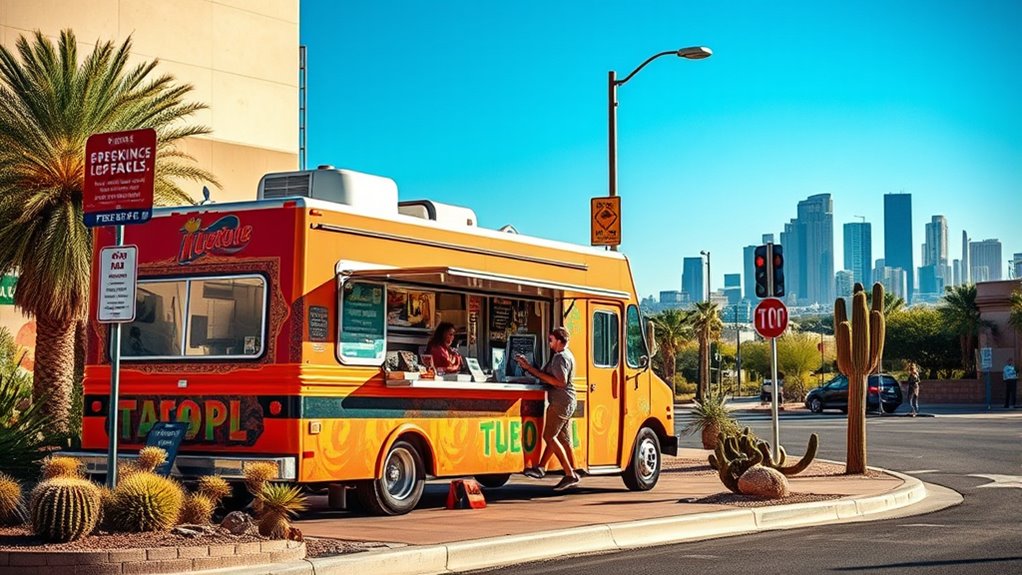
To operate your food truck legally, you need to obtain permission from private property owners and follow zoning regulations. Make certain your location complies with setback requirements, parking rules, and signage restrictions. Understanding these rules helps you avoid fines and guarantees your business runs smoothly. Additionally, researching local regulations regarding electric power sources can help you determine whether alternative energy options, like solar panels or bike generators, are permitted for powering your truck.
Private Property Permissions
Have you checked whether you have the necessary permission to operate your food truck on private property in Phoenix? You must obtain written permission from the property owner, and it must specify the exact parcel or site listed in your vending license. Keep this documentation updated and ready for inspection, as the City Clerk may request it. Operating without proper authorization is illegal and can lead to enforcement actions. Be aware that legal protections for food truck operators on private property can vary, so understanding local laws is essential.
Consider these key points:
- Each private location requires separate permission and possibly a new or amended license.
- Utility connections like electricity or water need permits and inspections; unauthorized hookups can result in penalties.
- Your vending unit must stay within size limits, maintain safe perimeter distances, and operate only on designated parcels, avoiding vision triangles and prohibited hours.
Zoning and Permit Restrictions
Zoning regulations in Phoenix determine where you can legally operate your food truck and what restrictions apply. If you plan to set up on vacant lots, they must fall under the Commercial C-3 District, requiring at least three designated parking spaces for your truck. You’ll need a plot plan showing your approved location and must stay within its boundaries, keeping a 10-foot clear zone for safety. Signs are regulated by city ordinance, limiting size and lighting. Your truck must meet size limits—24 feet long, 10 feet wide, and 12 feet high—and avoid obstructing parking spaces. If operating near residential zones, maintain a 30-foot setback, and comply with noise and height restrictions. A building or use permit from the Planning Department is mandatory, along with proper documentation of property permission. Additionally, incorporating zoning laws into your planning process ensures compliance with local regulations and helps prevent potential violations.
Developing a Food Menu and Ensuring Food Safety Compliance
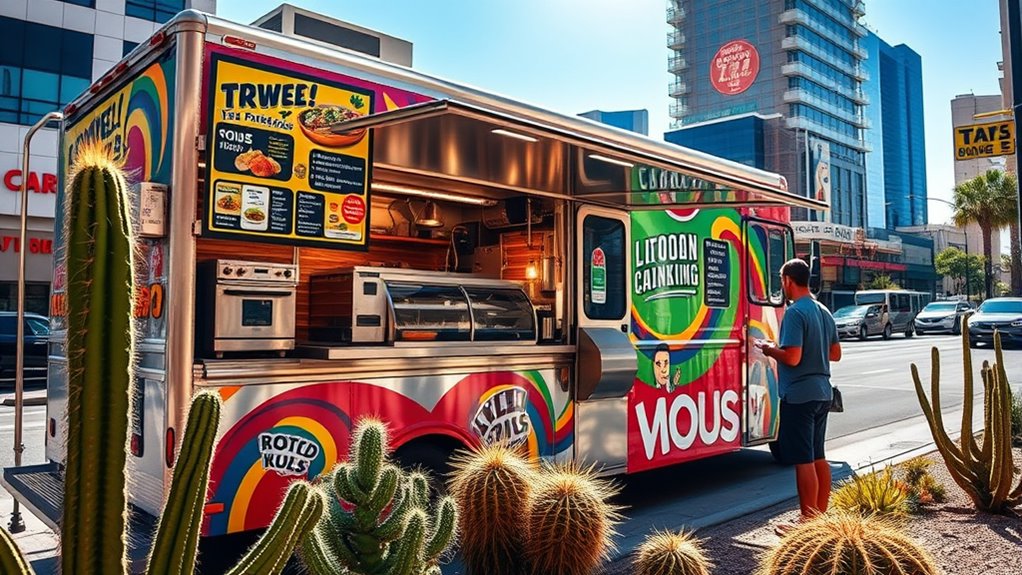
When developing your food menu, you need to consider your truck’s size and equipment to ensure efficient prep and service. You also must follow food safety regulations, like avoiding raw animal foods unless permitted and protecting your offerings from contamination. By focusing on quick, safe preparation methods and staying compliant, you’ll keep customers happy and meet health standards. Proper training for staff on food safety procedures is essential to maintain high standards and prevent cross-contamination. Incorporating food safety regulations into your training ensures all staff understand proper handling and storage practices.
Menu Development Strategies
Developing a food menu for a food truck requires strategic planning to attract your target customers and guarantee operational efficiency. You need to define your audience, focus on niche tastes, and prioritize quick, portable dishes. You need to consider features and functionality that enhance customer experience and streamline service. Keep your menu concise, featuring standout items in clear categories like mains and sides. Use bold headings or icons to guide customers easily, and highlight popular or high-margin options. Incorporate seasonal or local ingredients to keep offerings fresh and relevant. Regularly update your menu based on customer feedback and trends, experimenting with regional flavors or innovative ingredient combinations. Manage costs carefully by focusing on dishes with low food costs and sharing ingredients across items. Visual presentation, like digital menus or specials boards, can boost appeal and drive sales. Digital menus and visual design have become increasingly important, as they enhance customer engagement and streamline ordering processes.
Food Safety Protocols
How can you guarantee your food truck’s menu not only attracts customers but also complies with food safety regulations? First, ensure all food prep, cooking, and storage happen inside your permitted mobile unit. Use an approved prep sink for washing produce if needed. Prepare TCS foods on the same day, avoiding overnight storage unless approved. Keep self-serve items wrapped or dispensed to prevent contamination. As the Person In Charge (PIC), control access to food areas, monitor temperatures continuously, and document holding times. Maintain cleanliness by sanitizing equipment and managing waste properly. Train staff on hygiene practices, including handwashing and glove use. Regular inspections, record-keeping, and adherence to HACCP plans help you stay compliant, protecting your customers and your business. Additionally, understanding bank hours and scheduling accordingly can help you coordinate supply deliveries and banking needs effectively.
Effective Marketing Strategies to Grow Your Food Truck Brand
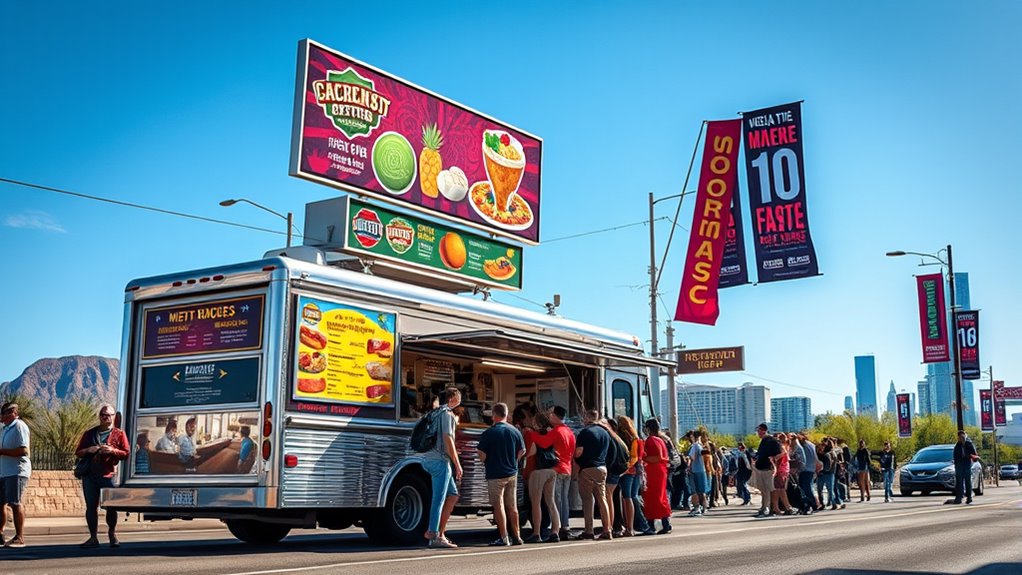
Effective marketing is essential for growing your food truck brand and standing out in a competitive market. By leveraging social media, participating in local events, and building customer loyalty, you can boost visibility and sales. Focus on creating engaging campaigns on platforms like Facebook, which 75% of food trucks use, resulting in a 20% sales increase for over half of them. Attend community festivals and partner with local businesses to enhance brand recognition and drive foot traffic. Implement loyalty programs and collect customer data to personalize offers and encourage repeat visits, which can increase customer spending by 15%. Use data analytics and mobile apps to optimize marketing efforts, making your brand more appealing to Millennials and Gen Z audiences. Incorporating cultural and regional breakfast traditions into your menu and branding can also attract diverse customer bases.
- Engage actively on social media to build a loyal customer base
- Collaborate with local events for increased exposure
- Use data insights to tailor your marketing and menu offerings
Step-by-Step Application and Ongoing Compliance Procedures
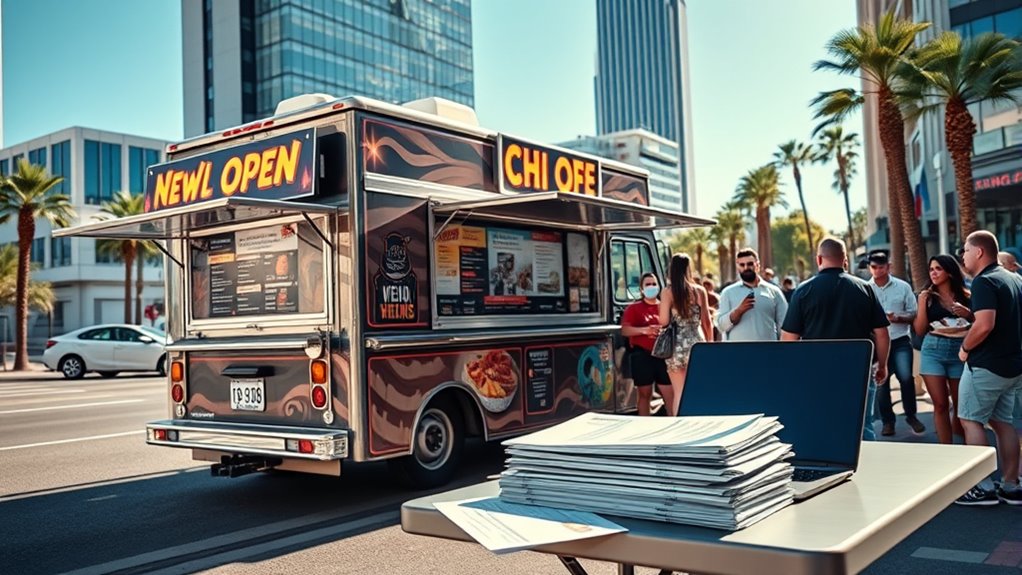
Getting your food truck on the streets requires following a series of specific application and compliance steps. First, you’ll need to submit your Mobile Food Vending License application in person at the City Clerk’s office, including a completed form, government-issued ID, and business documents like LLC registration if applicable. Provide detailed site info, owner approval, and photos of your vending location. Attach Maricopa County food permits and food handler cards for all staff, plus proof of insurance covering liability, auto, and workers’ comp. Pay application (~$350), annual (~$30), and relocation (~$95) fees promptly. Confirm zoning compliance, obtain necessary permits, and secure property owner permission. Maintain health permits, keep documentation current, and renew licenses annually. Regularly check regulations to avoid fines or permit revocation. Ensuring that your food safety practices meet local standards is essential for ongoing compliance and customer trust.
Frequently Asked Questions
What Are the Specific Health and Safety Training Requirements for Staff?
You need to guarantee your staff completes the required health and safety training. All food handlers must take a 2-hour Food Handler Training course and pass an exam to get certified. At least one Certified Food Manager, who has completed an 8-hour course and passed an ANSI exam, must be on staff. Keep certifications current, typically every three years, and verify local county requirements to stay compliant.
How Often Do Food Truck Permits Need Renewal or Inspection?
You need to renew your food truck permit annually, with the process taking about 90 days, so early renewal is wise. Inspections are also yearly, covering health, fire safety, and vehicle standards. Make sure your inspections are current within the last 12 months, and submit the required documentation for renewal. Keeping up with these renewals and inspections guarantees your food truck remains compliant and operational without interruptions.
Are There Restrictions on the Types of Food I Can Sell From My Truck?
You’re facing a maze of rules that could feel overwhelming, but don’t worry—your options are more limited than you might think. Regulations restrict you to foods with minimal handling, like hot dogs or pre-cooked items, and demand fresh prep daily. Complex dishes or those needing special utilities might be off-limits. Always verify your menu complies with health, safety, and zoning laws, or risk losing your license and customers.
Can I Operate My Food Truck Year-Round in Phoenix?
Yes, you can operate your food truck year-round in Phoenix. The city’s mild winters and dry climate allow for continuous outdoor vending, and there are no explicit seasonal restrictions. Just make certain you have the proper permits, like a food service permit and mobile vending license, and plan for extreme summer heat and monsoon storms. With the right safety measures, your food truck can serve customers throughout the year.
What Are the Best Practices for Parking and Securing Permits at Events?
You should develop a detailed parking plan, guaranteeing space for staff, vendors, and customers while avoiding congestion. Always secure the necessary event permits, including specific parking and traffic management approvals, and submit all required documentation well in advance. Assign a dedicated onsite contact during events to handle real-time issues, and ensure your unit is properly secured and displays all city-required signage. Following these best practices helps keep your operation compliant and running smoothly.
Conclusion
Starting your food truck in Phoenix means mastering permits, managing costs, choosing locations, crafting a menu, and marketing effectively. It’s about steering regulations with confidence, budgeting wisely with clarity, selecting spots strategically, creating dishes passionately, and promoting consistently. By staying organized, staying compliant, staying creative, and staying dedicated, you’ll build a successful food truck brand. Remember, success comes from preparation, perseverance, and passion—keep these at the core of your journey every step of the way.
